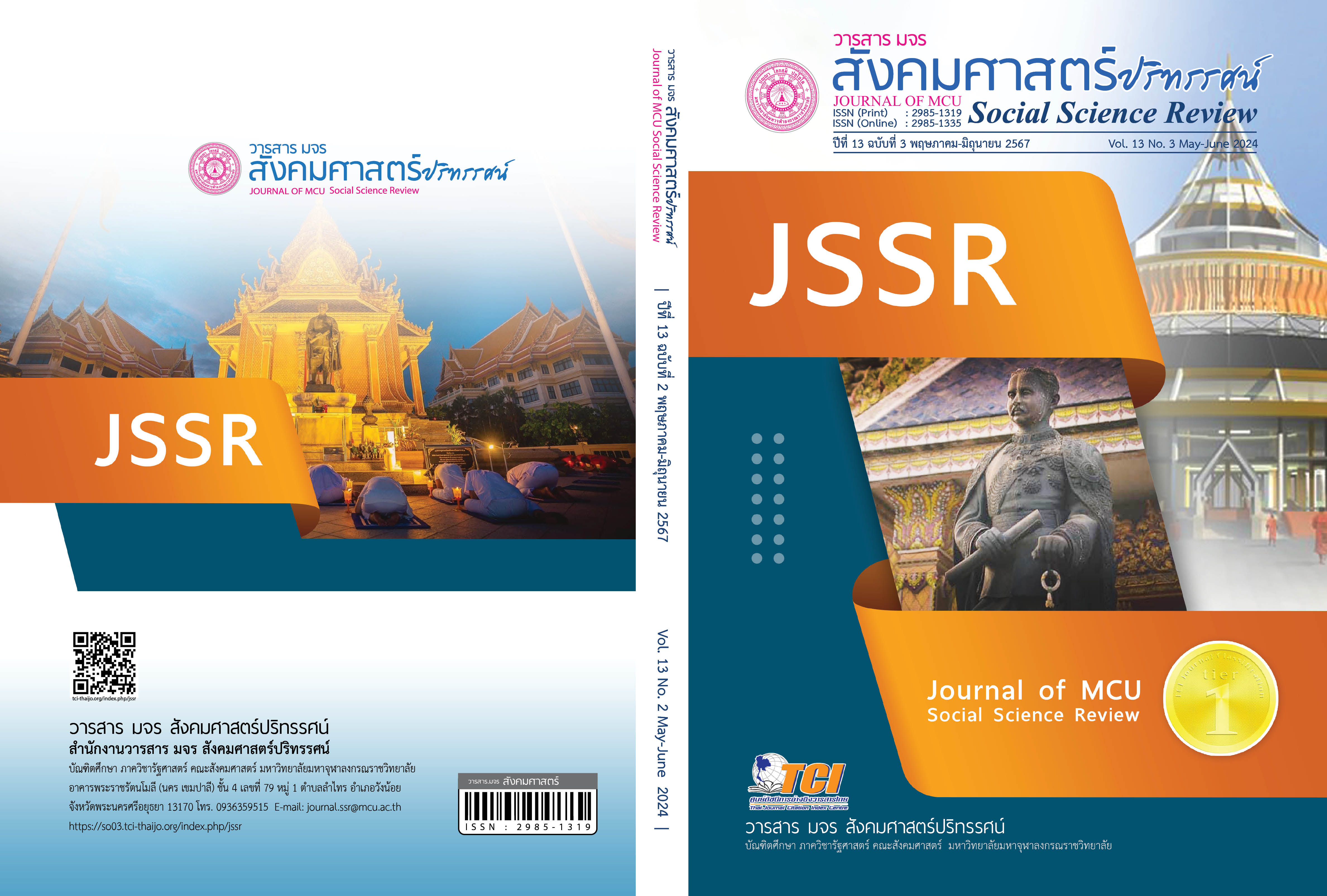แนวทางการจัดทำบัญชีแบบลีนเพื่อความยั่งยืนของบริษัทจดทะเบียน ในตลาดหลักทรัพย์แห่งประเทศไทย
คำสำคัญ:
การจัดทำบัญชีแบบลีน, ความยั่งยืน, ตลาดหลักทรัพย์บทคัดย่อ
การจัดทำบัญชีแบบลีนมีปัจจัยสำคัญที่กำหนดความสำเร็จของการนำแนวคิดของลีนมาใช้ ได้แก่ ภาวะผู้นำของผู้บริหาร การจัดการทางการเงินของกิจการ วัฒนธรรมองค์กร และทักษะความเชี่ยวชาญเกี่ยวกับลีน การบริหารต้นทุนเชิงกลยุทธ์ในด้านห่วงโซ่คุณค่าในด้านการบัญชีแบบลีนและด้านการต้นทุนเป้าหมาย การบัญชีแบบลีนที่มีองค์ประกอบได้แก่การวิเคราะห์และวัดมูลค่าการบันทึกบัญชีและรายงานสารสนเทศทางการเงิน คุณลักษณะระบบสารสนเทศทางการบัญชีและความโปร่งใสของข้อมูลสารสนเทศทางการบัญชี ซึ่งมีประโยชน์ทำให้กิจการมีการลดต้นทุนเนื่องจากเกิดการกำจัดความสูญเปล่า จนนำไปสู่ความสามารถในการแข่งขัน เนื่องจากมีการลดทุนทางด้านเวลาและวัสดุสิ้นเปลืองต่าง ๆ ในองค์กร ส่งผลให้ประสิทธิภาพในกระบวนการบัญชีเพิ่มขึ้น นอกจากนี้ยังพบว่าการบัญชีแบบลีนเป็นการเพิ่มประสิทธิภาพในกระบวนการการบัญชีและความยั่งยืนสอดคล้องกับทฤษฎีการบริหารเชิงสถานการณ์ กลยุทธ์ที่จะนำไปสู่ความยั่งยืนนั่นคือกลยุทธ์การประยุกต์ใช้แนวคิดแบบลีน 3 ด้านด้วยกัน ได้แก่ ด้านเศรษฐกิจ ด้านสังคม และด้านสิ่งแวดล้อม และมีความสัมพันธ์ในทางบวกระหว่างความยั่งยืนและผลปฏิบัติงานทางการเงิน ความรับผิดชอบขององค์กรต่อสังคมและสิ่งแวดล้อมนำไปสู่ความสามารถในการทำกำไรที่ยั่งยืน ซึ่งการใช้บัญชีแบบลีนจะทำให้บริษัทมีความยั่งยืน โปร่งใส และประหยัดต้นทุนการทำบัญชี
เอกสารอ้างอิง
ไตรรงค์ สวัสดิกุล. (2563). การบัญชีแบบลีนในอุตสาหกรรมสิ่งทอและเครื่องนุ่งห่ม: การศึกษาเปรียบเทียบและผลกระทบต่อผลการดำเนินงานของกิจการ. วารสารเกษตรศาสตร์ธุรกิจประยุกต์, 40(1), 77-93.
นิพนธ์ กาญจนพิพัฒน์กุล. (2554). การบัญชีแบบลีน. กรุงเทพ: อี.ไอ.สแควร์.
รมิดา คงเขตวณิช. (2562). ปัจจัยที่มีผลกระทต่อการบัญชีแบบลีนและผลการดำเนินงานของวิสาหกิจขนาดกลางและขนาดย่อมในประเทศไทย (ดุษฎีนิพนธ์ปรัชญาดุษฎีบัณฑิต สาขาวิชาการบัญชี). กรุงเทพฯ: มหาวิทยาลัยศรีปทุม.
วรธิดา รัตนโค้น. (2559). การประยุกต์ใช้แนวความคิดแบบลีนมาปรับปรุงกระบวนการทำงานของแผนกบัญชีกรณีศึกษาของ บริษัท เอ็มเอ็มทีเอช เอ็นจิ้น จำกัด จังหวัดชลบุรี. สืบค้น 23 พฤษภาคม 2565, จาก https://shorturl.asia/nv41R
Achanga, P. et al. (2006). Critical success factors for lean implementation within SMEs. Journal of Manufacturing Technology Management, 17(4), 460-471.
Adam, S. et al. (2016). Industry 4.0 Implies Lean Manufacturing: Research Activities in Industry 4.0 Function as Enablers for Lean Manufacturing. Journal of Industrial Engineering and Management, 9(3), 811-833.
Allawi, K. M. et al. (2019). The compatibility between lean accounting and cleaner production for achieving competitive advantage. Polish Journal of Management Studies, 20(2), 202-218.
Amusawi, E. G. et al. (2019). Impact of lean accounting information on the financial performance of the healthcare institutions: A case study. Journal of Engineering and Applied Sciences, 14(2), 589-399.
Darnall, N. & Edwards Jr, D. (2006). Predicting the cost of environmental management system adoption: the role of capabilities, resources and ownership structure. Strategic management journal, 27(4), 301-320.
Fahriye, U. (2012). An integrated model for sustainable performance measurement in supply chain. Elsevier Journal, 62(6), 689-694.
Fullerton, R. R. et al. (2014). Lean manufacturing and firm performance: The incremental contribution of lean management accountingpractices. Journal of Operations Management, 32(7-8), 414-428.
Garza, R. & Jose, A. (2015). Lean and Green – A systematic review of the state of the art literature. UK: The University of Derby.
Gerald, K. (2012). Use Lean Accounting to Add Value to the Organization. The Journal of Corporate Accounting & Finance, 23(3), 35-41.
Haber, J. P. (2008). Lean Accounting Best Practices. Knoxville: University of Tennessee.
Heesup, H. & Ryu, K. (2009). The Roles of the Physical Environment, Price Perception, and Customer Satisfaction in Determining Customer Loyalty in the Restaurant Industry. Journal of Hospitality & Tourism Research, 33(4), 487-510.
Hernadi, B. H. (2012). Green accounting for corporate sustainability. TMP, 8(2), 23-30.
Maskell, B. H. & Baggaley, B. L. (2003). Practical Lean Accounting. A proven system for measuring and managing the lean enterprise. New York: NY.
Maskell, B. H. (2014). Lean Management Accounting. Retrieved September 10, 2022, from https://shorturl.asia/e9E0k
Maskell, B. H. et al. (2011). Practical Lean Accounting: A Proven System for Measuring and Managing the Lean Enterprise. Boca Raton: CRC Press.
Womack, J. (1996). Lean Consumption form EE Manufacturing Engineer. USA: McGraw Hill.
Womack, J. P. et al. (1990). The Machine that Changed the World. New York: Simon and Schuster.
ดาวน์โหลด
เผยแพร่แล้ว
รูปแบบการอ้างอิง
ฉบับ
ประเภทบทความ
สัญญาอนุญาต
ลิขสิทธิ์ (c) 2024 วารสาร มจร สังคมศาสตร์ปริทรรศน์

อนุญาตภายใต้เงื่อนไข Creative Commons Attribution-NonCommercial-NoDerivatives 4.0 International License.
เพื่อให้เป็นไปตามกฎหมายลิขสิทธิ์ ผู้นิพนธ์ทุกท่านต้องลงลายมือชื่อในแบบฟอร์มใบมอบลิขสิทธิ์บทความให้แก่วารสารฯ พร้อมกับบทความต้นฉบับที่ได้แก้ไขครั้งสุดท้าย นอกจากนี้ ผู้นิพนธ์ทุกท่านต้องยืนยันว่าบทความต้นฉบับที่ส่งมาตีพิมพ์นั้น ได้ส่งมาตีพิมพ์เฉพาะในวารสาร มจร สังคมศาสตร์ปริทรรศน์ เพียงแห่งเดียวเท่านั้น หากมีการใช้ภาพหรือตารางหรือเนื้อหาอื่นๆ ของผู้นิพนธ์อื่นที่ปรากฏในสิ่งตีพิมพ์อื่นมาแล้ว ผู้นิพนธ์ต้องขออนุญาตเจ้าของลิขสิทธิ์ก่อน พร้อมทั้งแสดงหนังสือที่ได้รับการยินยอมต่อบรรณาธิการ ก่อนที่บทความจะได้รับการตีพิมพ์ หากไม่เป็นไปตามข้อกำหนดเบื้องต้น ทางวารสารจะถอดบทความของท่านออกโดยไม่มีข้อยกเว้นใดๆ ทั้งสิ้น





